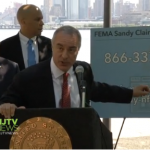The Politics Of Disaster Relief
By Art Gallagher, [email protected]
When disaster hits, natural or man made, Americans put aside their differences and come together to handle the emergency.
We saw it with 9-11. Most recently in New Jersey we saw it with Superstorm Sandy.
Once the emergency is over and the federal money is flowing, the politics…partisanship and patronage starts. We saw it with 9-11. We’re living it with Sandy.
Post 9-11 when the newly created Department of Homeland Security was spending heavily to ensure our security against future terrorists attacks, New Jersey, a terrorists hot spot whose residents suffered catastrophic losses, was being shortchanged.
In April of 2003, the G.W. Bush Administration’s DHS spokeswoman Rachel Sunbarger told The Star Ledger that the department exercised discretion in funding New York City projects and not New Jersey projects because “We wanted to keep it clean this round.”
Maybe it was a coincidence, but New York was being governed by Republican Governor George Pataki. Mayor Michael Bloomberg was a Republican at the time. The Republican Bush administration was distributing the DHS money. Democrat Jim McGreevey was governor of New Jersey.
Led by Congressman Chris Smith, a Republican and the “Dean” of New Jersey’s congressional delegation, New Jersey’s U.S. senators, Democrats Frank Lautenberg and Jon Corzine, and 13

Congressman Chris Smith and Monmouth County Shaun Golden prepare to survey Hurricane Sandy damage. November, 2012
congressmen, 7 Democrats, including Bob Menendez, now a senator, and Frank Pallone and 6 Republicans, put aside their partisan differences to appeal to Republican DHS Secretary Tom Ridge to direct a significant share of the departments discretionary funding to New Jersey. All 15 members of the New Jersey congressional delegation signed a letter to Ridge dated April 22, 2003.
The bi-partisan appeal to Ridge worked. On May 14, 2003, Smith’s office announced that $68 million in DHS funds became available to New Jersey.
Last week, Smith stepped up again to lead the delegation in serving New Jersey in a non-partisan fashion in an effort to break open the bureaucratic logjam that is delaying thousands of New Jersey residents from rebuilding their Sandy ravaged homes.
Led by Smith again, five New Jersey congressman, three of whom have thousands of constituents caught up in the bureaucratic labyrinth of Superstorm Sandy relief applications, signed a letter to HUD Secretary Shaun Donovan and Michael Boots, the Acting Chair of the White House’s Council on Environmental Quality, requesting a meeting to discuss critical issues regarding the delays in getting much needed Sandy relief to homeowners. This letter is a response, in part, to the letter sent to New Jersey’s entire congressional delegation, 11 congressmen and Senators Bob Mendez and Cory Booker, by NJ State Senators Jennifer Beck, Joe Kyrillos, Robert Singer, James Holzapfel and Sam Thompson on March 31, wherein the NJ legislators ask for congressional help in getting Sandy money to the people who need it.
This time, no Democrats signed Smith’s letter. Smith’s staff waited three days to release the letter, hoping to get the entire delegation on board with the appeal to Donovan and Brooks to cut the red tape that is causing so much suffering in New Jersey.
The congressmen question whether New Jersey is receiving its fair share of Sandy funding, and the maddening rule in the Rehabilitation, Reconstruction, Elevation and Mitigation (RREM) program that allows homeowners to be reimbursed for work they have done to their homes before applying for RREM grants, but not for work done while their RREM applications are being evaluated. The effect of this rule has been a “stop work order” on thousands of homes for the months it takes for the RREM applications to be reviewed for the historical and environmental significance of the properties.
The letter dated April 8, 2014 can be viewed here. It was signed by Smith (NJ-4, Monmouth Ocean and Mercer), Congressmen Rodney Frelinghuysen (NJ-11, Morris, Passaic, Essex and Sussex), Leonard Lance (NJ-7, Union, Hunterdon, Morris, Essex and Warren), Frank LoBiondo (NJ-2, Atlantic, Cape May, Ocean, Burlington,Camden, Gloucester, Cumberland and Salem), and Jon Ruyan (NJ-3, Ocean and Burlington).
Noticeably absent as a signer is Congressman Frank Pallone (NJ-6, Monmouth and Middlesex) whose coastal Monmouth and Middlesex district was particularly hard hit by Sandy.
Also missing as signers of the Smith letter are Congressmen Albio Sires (NJ-8, Hudson, Essex, Bergen and Union) whose district includes Sandy ravaged Hoboken, Bill Pascrell (NJ-9, Bergen, Hudson and Passaic) whose district includes Moonachie which was underwater during and after Sandy, and Donald Payne, Jr (NJ-10, Essex, Hudson and Union) whose district includes Newark.
Congressmen Rush Holt, a Democrat, and Scott Garrett, a Republican, also did not sign the letter. Their districts did not suffer catastrophic damage from Sandy.
Senators Bob Menendez and Cory Booker did not sign the letter. Both are Democrats.
Pallone’s spokesman Ray Zaccarro said he would ask the congressman for an explanation as to why he didn’t sign Smith’s letter, but didn’t get back to me after three requests.
At Senate President Steve Sweeney’s Town Hall Meeting in Keansburg last month, Pallone said, in answer to my question, that the rebuilding delays resulting from RREM (Rehabilitation, Reconstruction, Elevations and Mitigation) grant rules were a matter of federal regulations and that legislation was not required to fix the problems. Pallone said “we” are working on easing the regulations. Apparently Pallone’s “we” does not include other members of the New Jersey delegation.
A few days later at a Town Hall Meeting in Belmar, Governor Chris Christie said that HUD Secretary Shaun Donovan told him that the RREM rules were a matter of law, not of regulation.

Governor Chris Christie and HUD Secretary Shaun Donovan announcing Sandy Relief Funding at Bahrs Landing, Highlands, April 2013.
Both the NJ state Senators’ letter, which was spearheaded by Beck, and the Smith letter last week, were efforts to break the logjam and end the political finger pointing.
Rather than come together and pull in the same direction as Republicans to break the logjam in Sandy relief, New Jersey Democrats, on both the federal and state levels are scoring political points with the maddening delays, mostly against Republican Governor Chris Christie.
That’s not to say that Christie and his administration have been infallible angels. The fact that they’ve been less than transparent regarding the compensation for HGI and other contractors is maddening. It’s clearly political and bad politics at that, in that it has given Pallone and Sweeney an issue to make hay with. The fact that RREM applicants can’t get straight answers about where they are in the process is bad policy and bad politics.
But ultimately, Christie has no political motivation to slow down Sandy recovery. He benefits politically by a swift recovery.
That is very likely why New Jersey’s state and federal Democrats are fine with the delays in Sandy recovery. It’s probably why Democrats in the Obama Administration are causing the delays and short changing New Jersey’s Sandy funding. They fear Christie as a potential presidential candidate.
The New Jersey Democrats that control the state legislature are not delaying Sandy victims from rebuilding their homes. But those Democrats, especially Sweeney, are using the delays caused in Washington to score political points in New Jersey.
Why did Senator Beck have to settle for having her Republican colleagues that represent Monmouth and Ocean counties sign her letter to the congressional delegation? Wouldn’t a resolution passed unanimously by the entire Senate, or better yet a joint resolution with the Assembly have been a more powerful message to Washington?
Sweeney could have made that happen. Why didn’t he?
Sweeney is touring the state ostensibly to build support for his Sandy Bill of Rights legislation. The bill seems to make perfect sense. It requires plain language explanations of disaster assistance programs and gives applicants the right to know where they are in the process, where they are on waiting lists, and how to appeal.
Sweeney is not touring the state to bash Christie or to garner support for the bill. As Senate President, Sweeney could have passed the bill already without traveling north of Trenton. If he wanted to score points against Christie, that’s what he would have done, because the bill is a no-win for Christie. If he signs it, it will be spun as an admission that it was necessary; that his administration lacked plain language and transparency is distributing federal Sandy funds. If Christie vetoed it, Pallone, Sweeney, The Star Ledger and MSNBC would beat the governor up over it.
Sweeney is using the Washington caused delays in Sandy relief to lay the ground work for his campaign to succeed Christie as governor. He’s touring the state to gain name recognition and to appear to be the champion of Sandy victims. But Sweeney is lying about the cause of the delays.
In an OpEd published Friday in The Jersey Journal (a Jersey City publication whose content is published on NJ.com) Sweeney told the story of Ed Kelly of Keansburg.
Ed Kelly listened to government officials who told him to quickly rebuild after his Keansburg home was destroyed by the storm. He took out a loan, hired an architect and secured permits. Basically, he did what he was told to do. He followed the rules. But he didn’t get the aid he expected and certainly needed. After paying out a significant amount of money, Kelly was told he was no longer eligible for certain grants because he had listened to state officials and started the work before damage and paperwork could be verified. (emphasis added)
Sweeney knows that Kelly’s problems were not caused by listening to state officials. Immediately after Kelly told his compelling story at the Sweeney Town Hall in Keansburg, Pallone, in a rare moment of unscripted candor, raised his right hand and said he would swear under oath that he heard FEMA employees at the Bayshore Disaster Center in Leonardo tell residents to “go, go, go, rebuild” and get reimbursed later. Sweeney heard Pallone swear that.
Pallone backed up Kelly’s story. “I was there at the Disaster Center in Highlands or Port Monmouth, where ever it was,” Pallone said (it was in Leonardo),” and heard employees of FEMA or whoever tell people to go, go go, rebuild.” Pallone raised his right hand and said, “I’ll tell the jury that is what I heard.”
Sweeney rightly expressed his outrage at the lies Kelly was told. But the Sandy Bill of Rights will not help Kelly and it would not have helped Kelly had it been in place when the storm hit. No state legislation is going to keep the federal government from misleading people and manipulating into being ineligible for assistance.
Pallone said he and his colleagues are trying to fix the situation for people like Kelly, and thousands of others who are caught in the labyrinth HUD and FEMA created.
I asked Pallone what was necessary to fix the problem, is legislation required or is the problem one of regulations. “I don’t think legislation is necessary,” Pallone said, “we’re trying to get them to change the rules.”
Playing politics with people’s lives needs to stop. Pallone, Booker, Menendez and the rest of New Jersey’s congressional delegation should belatedly sign on to the Smith letter’s request of a meeting with Donovan and Boots. Sweeney should usher a joint resolution through the legislature to back up the Beck letter. And Christie should stand up to the Democrats in the Obama administration holding up and short changing New Jersey the same way the stood up to Speaker John Boehner and the Congressional Republicans when they were playing games with the Sandy Relief package.











